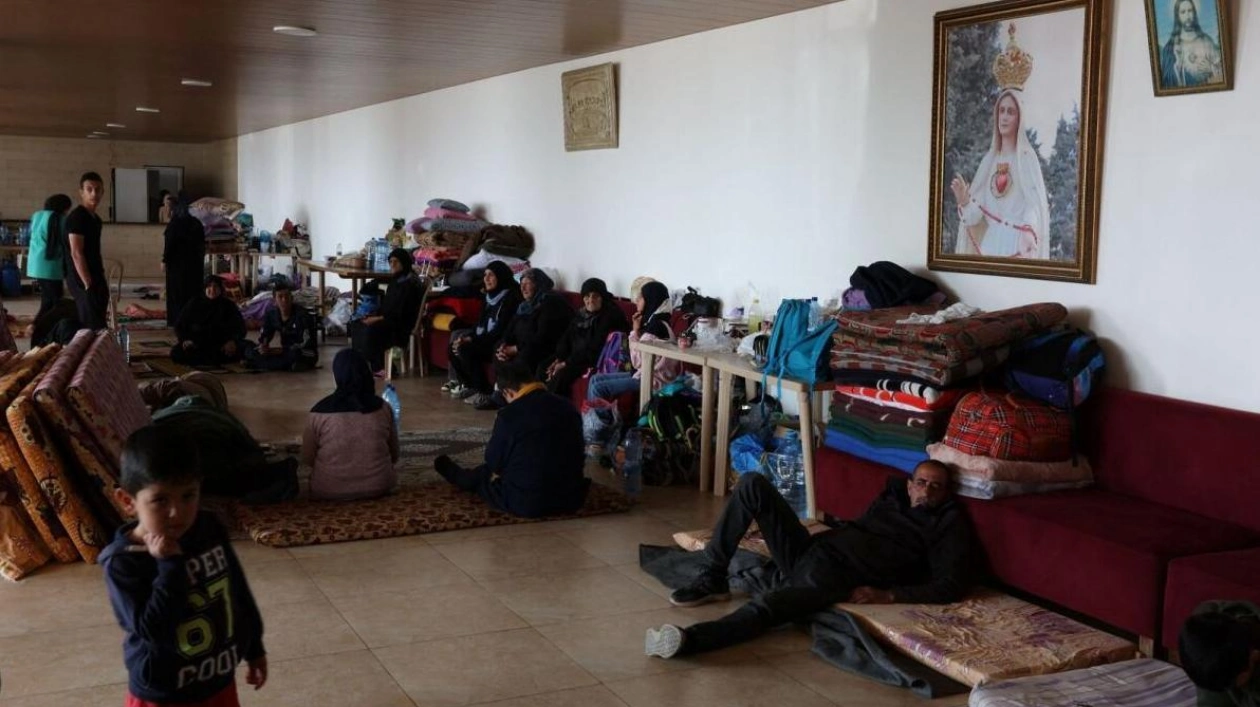Displaced individuals, having fled Baalbek and its neighboring regions, find refuge within a church in Deir Al Ahmar, Lebanon, on October 31, 2024. — Reuters
Lebanon's prime minister conveyed optimism on Wednesday that a ceasefire agreement with Israel would be declared in the coming days, as Israel's public broadcaster unveiled what it claimed was a draft accord proposing an initial 60-day truce. The document, which broadcaster Kan stated was a leaked proposal authored by Washington, indicated that Israel would withdraw its forces from Lebanon within the first week of the 60-day ceasefire. This largely corresponded with details previously reported by Reuters, based on two sources knowledgeable about the matter.
Lebanese caretaker Prime Minister Najib Mikati initially doubted a deal would be feasible until after Tuesday's US presidential election. However, his outlook brightened after a Wednesday conversation with US Middle East envoy Amos Hochstein, who was scheduled to travel to Israel on Thursday. "Hochstein, during our call, hinted that we might reach an agreement before the month's end and before November 5th," Mikati informed Lebanon's Al Jadeed television. "We are exerting all efforts and should remain hopeful that a ceasefire will be achieved in the coming hours or days," Mikati added.
The draft published by Kan was dated Saturday. When queried for comment, White House national security spokesperson Sean Savett stated, "Numerous reports and drafts are circulating. They do not mirror the current state of negotiations." However, Savett did not address whether the version published by Kan served as a foundation for further negotiations. The Israeli network claimed the draft had been presented to Israel's leaders, though Israeli officials did not immediately comment.
Israel and Lebanese armed group Hezbollah have been engaged in conflict for the past year, paralleling Israel's war in Gaza, after Hezbollah attacked Israeli targets in solidarity with its ally Hamas in Gaza. The conflict in Lebanon has significantly intensified over the last five weeks, with the majority of the 2,800 deaths reported by the Lebanese health ministry over the past 12 months occurring during this period. Hezbollah did not immediately comment on the leaked ceasefire proposal.
Earlier on Wednesday, Hezbollah's new leader, Naim Qassem, stated that the Iran-backed armed group would consent to a ceasefire under specific conditions if Israel wished to halt the war, but Israel had not yet agreed to any proposal that could be discussed. This marked Qassem's inaugural speech as secretary-general, a day following Hezbollah's announcement of his election to the post after Israel assassinated the group's long-time leader Hassan Nasrallah.
Israel's operation against heavily armed Hezbollah in Lebanon continued to escalate on Wednesday as the Israeli army conducted heavy airstrikes on the eastern city of Baalbek, renowned for its Roman temples, and adjacent villages, according to security sources. Tens of thousands of Lebanese, including many who sought shelter in Baalbek from other areas, fled following an Israeli evacuation warning. Bilal Raad, regional head of the Lebanese civil defense, described the scene as chaotic. "The entire city is in a state of panic, trying to determine where to go; there's a massive traffic jam," he said prior to the bombardment. The Lebanese health ministry reported 19 fatalities from Israeli strikes on two towns in the Baalbek area on Wednesday.
The Israeli military announced it had targeted Hezbollah fuel reservoirs in the Bekaa Valley region following the airstrikes. Responding to a question about Israel's bombardment of Baalbek, the US State Department reiterated on Wednesday that Washington supports Israel's right to pursue legitimate Hezbollah targets in Lebanon. However, it emphasized that Israel must do so without endangering civilians, critical civilian infrastructure, and significant cultural heritage sites. For the third consecutive day, Hezbollah reported intense clashes with Israeli forces in or around the southern town of Khiyam—the deepest Israel's troops have reportedly penetrated into Lebanon since the fighting escalated five weeks ago. Hezbollah also claimed to have targeted a military camp southeast of Tel Aviv in Israel with missiles.
The White House announced that US security official Brett McGurk would visit Israel on Thursday alongside Hochstein. A US official had mentioned they would be there to discuss a range of issues "including Gaza, Lebanon, hostages, Iran, and broader regional matters." The Lebanese prime minister did not comment on the draft proposal published by the Israeli network, which called for a permanent ceasefire to take effect after the initial 60-day period based on the implementation of United Nations resolutions 1701 and 1559. Mikati stated that Lebanon was prepared to fully implement 1701, passed in 2006, which directed the demilitarization of southern Lebanon and established a UN peacekeeping mission there. Earlier this month, Hochstein told reporters in Beirut that better enforcement mechanisms were needed as neither Israel nor Lebanon had fully implemented the 18-year-old resolution. The draft leaked on Wednesday proposed creating an independent, international arrangement to oversee the ceasefire.
Resolution 1559, adopted in 2004, called for the disbanding and disarming of all militias in Lebanon. The push for a ceasefire in Lebanon coincides with a similar diplomatic effort to end hostilities in Gaza.
Source link: https://www.khaleejtimes.com






